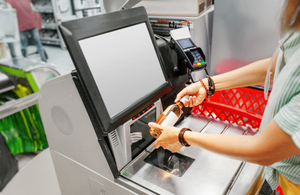Age verification technology to be trialled in shops, bars and restaurants
Retailers, bars and restaurants will be able to check the age of customers buying alcohol and other restricted items with new technology.

Getty images.
Both on and off licenced retailers, bars and restaurants have been invited to put forward proposals to trial new technology when carrying out age verification checks, Baroness Williams of Trafford has announced today (18 March 2021).
The call for proposals has been launched by the Home Office and the Office for Product Safety and Standards, and retailers who are successful will be able to pilot new technology to improve the process of ID check during the sale of alcohol and other age restricted items.
The pilots will explore how technology can strengthen current measures in place to prevent those under 18 from buying alcohol, reduce violence or abuse towards shop workers and ensure there are robust age checks on the delivery, click and collect or dispatch of alcohol.
Baroness Williams of Trafford, said:
Having a robust age verification system is absolutely critical in preventing the sale of alcohol to children and the harm under-age drinking causes.
These pilots will allow us to explore how new technology can improve the experience of buying and selling alcohol, both for the consumer and the retailer.
It will be up to applicants to suggest products to trial within their proposals, but technology that may potentially be tested include a holographic or ultraviolet identification feature on a mobile phone.
Retailers will be able to submit applications online on gov.uk and will be required to provide detail on how the technology works and how they plan to test it.
Currently, it is not possible to use a digital ID as proof of age for the purchase of alcohol in England and Wales. The pilots will allow a wide range of digital age verification technology to be tested, and the findings will be used to understand the impact of this technology and inform future policy, as part of the government’s ambition to create an innovative digital economy.
Tony Allen, Chair of the Expert Panel on Age Restrictions and CEO of the Age Check Certification Scheme, said:
We welcome this important initiative to properly test, evaluate and provide assurance and certification of the plethora of technologies that are emerging to help with age assurance.
This will assist with enhancing the protection of children from harm, but also potentially reducing the levels of abuse suffered by workers in licensed premises when challenging for proof of age.
The results of these Sandbox Trials, when independently evaluated, can help inform future policy development for the retail sale of alcohol.
Deputy Chief Constable of Suffolk Constabulary and NPCC lead on alcohol harm Rachel Kearton said:
As the National Police Chiefs Council lead for alcohol harm reduction and licensing I know that protection of children from harm is one of the cornerstones of the Licensing Act and as such I welcome the opportunity to explore new technologies that may assist retailers in the age verification process.
Retailers will still be required to carry out physical age verification checks alongside any digital technology in line with the current law, which requires a physical identification card with a holographic mark or ultraviolet feature upon request in the sale of alcohol.
The Office for Product Safety and Standards will be hosting a series of webinars over the next two months to assist members of the industry in drafting their proposals.
Applications will be assessed by a group of experts from a range of organisations, including the Home Office, Trading Standards, the Office for Product Safety and Standards and the Metropolitan police.
Trials by successful applicants will begin in the summer and must be completed by April 2022.
Retailers can submit their proposals to trial digital age verification technology on gov.uk.
Submissions close on 31 May and successful applicants be notified by 2 July.
Updates to this page
-
Trial completion date amended to April 2022.
-
First published.